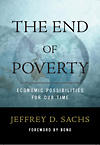Global Poverty and Development Aid

As leaders of the G8 recently agreed to raise aid levels and cancel the debt of Africa's poorest nations, global poverty remains a huge obstacle to human rights. An interesting perspective on how the world can combat global poverty comes from Professor Jeffery Sachs, Director of the Earth Institute at Columbia University and author of An End to Poverty: Economic Possibilities for Our Time. Sachs wrote an article in Foreign Affairs in March of this year about how the American public (and public officials) believes the country gives significantly more development aid than it actually does. In the "Development Challenge" Sachs gives the example of American aid to sub-Saharan Africa as he writes:
The case of sub-Saharan Africa-the poorest region of the world- shows how dangerously skewed U.S. aid priorities are. The prevailing image in the United States is that Washington gives Africa vast sums of money, which corrupt officials there then fritter away or stash in offshore accounts. But this image, fueled by inaccurate stereotypes, badly misconstrues the truth. In fact, in 2003, the United States gave $4.7 billion to sub-Saharan Africa in net bilateral ODA. Of that sum, $0.2 billion went to a handful of middle-income countries, especially South Africa. Of the remaining $4.5 billion, $1.5 billion was apportioned for emergency aid and $0.3 billion for non-emergency food aid. Another $1.3 billion was designated for debt forgiveness grants, and $1.4 billion went to technical assistance. This distribution left only $118 million for U.S. in-country operations and direct support
for programs run by African governments and communities-just 18 cents for each of the nearly 650 million people in low-income sub-Saharan Africa. This figure represents the total U.S. bilateral support, beyond aid in the form of technical cooperation, for investments in health, education, roads, power, water and sanitation, and democratic institutions in the region that year.
Sachs then offers solutions to increase developmental assistance to combat poverty, which he argues would increase our security in addition to helping those in poverty around the world. The above links provide good information about global poverty as well as lectures and talks by Professor Sachs.
For more information on global poverty and the UN Millennium Project click here.
--Tom Hayes



0 Comments:
Post a Comment
<< Home